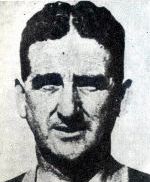 | |||
| Personal information | |||
|---|---|---|---|
| Full name | William Thomas Garbutt | ||
| Date of birth | 9 January 1883 | ||
| Place of birth | Hazel Grove, England | ||
| Date of death | 24 February 1964 (aged 81) | ||
| Place of death | Warwick, England | ||
| Position(s) | Outside right | ||
| Senior career* | |||
| Years | Team | Apps | (Gls) |
| 1903–1906 | Reading | ||
| 1906–1908 | Woolwich Arsenal | 52 | (8) |
| 1908–1911 | Blackburn Rovers | 82 | (10) |
| 1911–1912 | Woolwich Arsenal | 0 | (0) |
| Managerial career | |||
| 1912–1927 | Genoa | ||
| 1913–1914 | Italy[1] | ||
| 1927–1929 | Roma | ||
| 1929–1935 | Napoli | ||
| 1935–1937 | Athletic Bilbao | ||
| 1937 | Milan | ||
| 1937–1940 | Genoa | ||
| 1946–1948 | Genoa | ||
| *Club domestic league appearances and goals | |||
William Thomas Garbutt (9 January 1883 – 24 February 1964[2]) was an English professional football coach and player. His contribution to Italian football through laying the foundations of player training and coaching popularized the sport in the nation, and he was widely considered the model for professional managers in Italy.
Born in the small village of Hazel Grove in Stockport, Garbutt featured for Reading, Woolwich Arsenal, and Blackburn Rovers, but featured irregularly for each side, suffering persistent injuries. This forced Garbutt to retire in 1912, aged 29. He then relocated to Italy to seek employment as a dockworker in Genoa, but was soon appointed as the head coach for the local team. Following his arrival, Garbutt restructured training regimes, introduced tactics, and conducted Italy's first ever paid player transfers. This allowed him to transition the side from a semi-professional outfit into a dominant team, and Garbutt captured three Italian league championships during his fifteen-year reign at Genoa.
Garbutt would depart to join newly formed Roma in 1927, where he secured a Coppa CONI title, and then moved further south to coach Napoli in 1929. His tenure at both sides saw them finish in their highest ever positions in the league, which prompted interest from foreign clubs, and Garbutt departed Italy for Spain to coach Athletic Bilbao, where he won a La Liga title in 1936. He returned later that year for a brief reign at Milan, and was soon re-appointed at Genoa. However, Garbutt was exiled from the nation under the fascist policy of Benito Mussolini, and he was forced to return to England in 1940. After the end of World War II, Garbutt returned to Genoa for a third time in 1946, prior to retiring in 1948.
Although his achievements are not widely known in his home country, Garbutt was instrumental in making Italian football popular, and is credited for laying the groundwork for the nation to secure victory during the 1934 and 1938 FIFA World Cups.